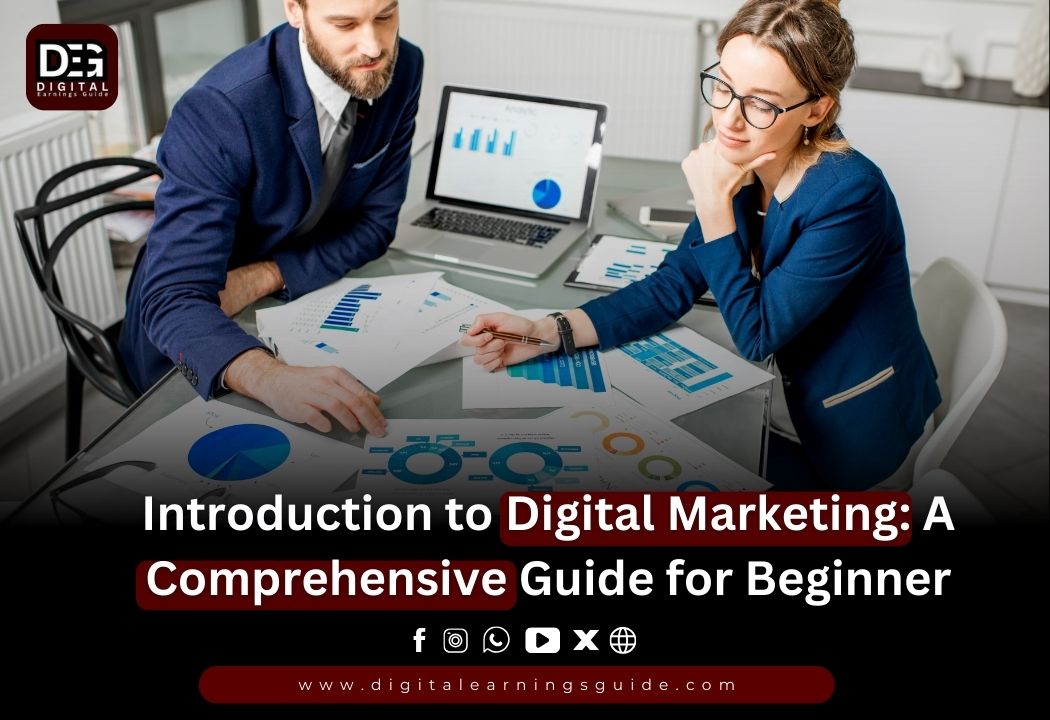Digital Marketing Complete Guide
What is digital marketing?
Digital marketing is a modern method by which businesses promote their products or services with the help of the Internet and other digital platforms. It is more effective, measurable and cost-effective than traditional marketing. With the help of digital marketing, companies can easily reach their target customers and interact directly with them.

Important Aspects of Digital Marketing:
- Website Marketing:
A user-friendly website is the main source of business where customers can find information or make purchases.
- Search Engine Optimization (SEO):
Through SEO, businesses can get their website to rank better on search engines (like Google) to get more traffic.
- Content Marketing:
It is creating informative, educational, or entertaining content (such as blogs, videos, and ebooks) that engages customers and drives them to purchase.
- Social Media Marketing:
Using social media platforms (Facebook, Instagram, Twitter, etc.), brands communicate directly with customers and attract them to their products or services.
- Email Marketing:
Providing information, promotions or updates to customers via e-mail in order to maintain regular contact with them.
- PPC (Pay Per Click):
Online ads that charge you per click, such as Google Ads. This way you can get traffic and customers to your website instantly.
- Influencer Marketing:
Promoting products or services through celebrities or social media influencers to attract their followers.
Advantages of Digital Marketing:
- Global Access:
- Thanks to the Internet, businesses can promote their products and services worldwide.
- Effective and low cost:
- Compared to traditional marketing, digital marketing is more effective and less expensive.
- Continuous Data Analysis:
- There are various analytics tools available for performance testing in digital marketing that monitor the success of each campaign.
- Targeted Marketing:
- With digital marketing you can reach your target customers directly, showing ads according to their interests and behaviors.
Key Components of Digital Marketing:
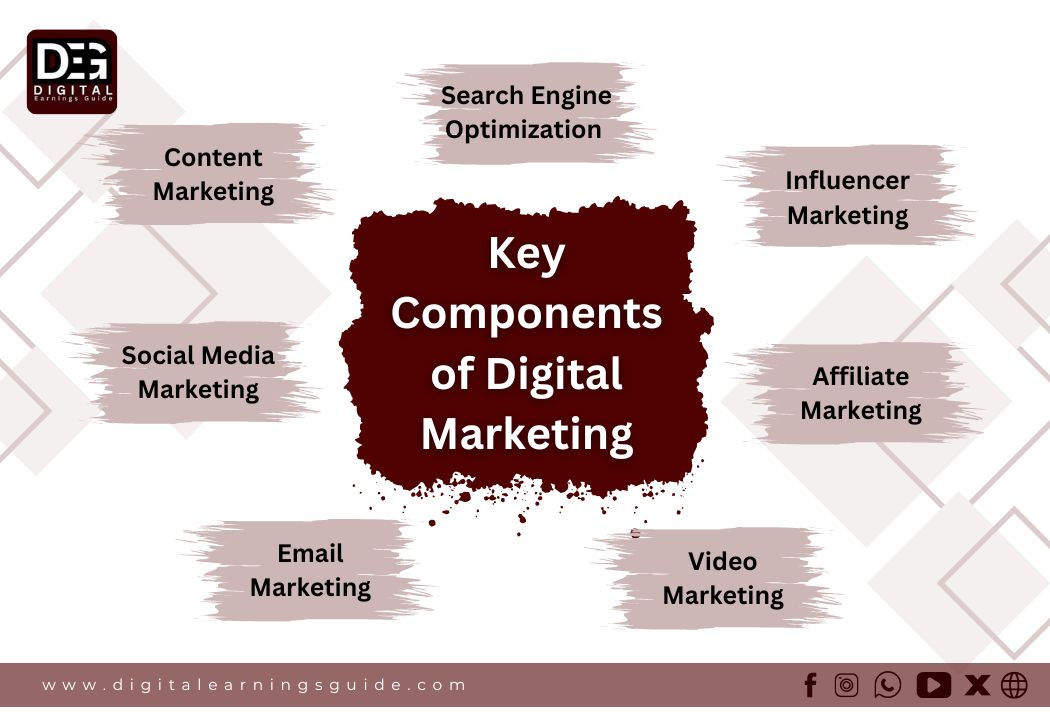
1: Search Engine Optimization (SEO):
The purpose of SEO is to rank the website better in search engines like Google so that the website can get more visitors. This includes using the desired keywords, content optimization, building backlinks, etc.
2: Content Marketing:
This includes creating blogs, articles, videos, infographics and other content that informs and engages consumers. Good content engages consumers and builds brand credibility.
3: Social Media Marketing:
Relationships with customers are strengthened by establishing a presence on various social media platforms like Facebook, Instagram, Twitter, LinkedIn etc. These platforms help to increase brand recognition and gain consumer feedback.
4: Email Marketing:
Emails are sent to specific customers to provide them with new products, special offers or company news. It is a direct and personal communication tool that increases customer loyalty.
5: PPC Ads:
These are pay-to-click ads that are displayed on search engines or social media platforms. PPC can generate instant traffic and is helpful in measuring marketing performance.
6: Video Marketing:
Products or services are advertised through videos. By sharing videos on YouTube, Facebook videos, Instagram stories, etc., the attention of users is gained.
7: Affiliate Marketing:
In affiliate marketing you pay other people a commission to sell your products or services. These partners promote your products on their websites or social media, and are paid for each sale or click. This is an effective way to promote your business without a huge investment.
Important aspects:
-
- Affiliate networks
- Commission model
8: Influencer Marketing:
In influencer marketing you promote your products or services through celebrities or social media influencers. These influencers have strong relationships with their followers, and their recommendations are highly valued. This type of marketing builds consumer confidence and increases brand recognition.
Important aspects:
-
- Selection of influencers
- Promotional partnership
9: Web Analytics:
The purpose of web analytics is to measure your digital marketing performance and gather data to improve it. With Google Analytics and other analytics tools, you can analyze website traffic, user behavior, and other metrics, helping you make better decisions.
Key Tools:
-
- Google Analytics
- Facebook Insights
- Search Console
Why Digital Marketing Is Important For Businesses Today:
Digital marketing has become very important for any business in today’s era. It not only meets the requirements of the modern age but also helps businesses reach their target customers in a more effective, quick and cost-effective manner. Here is a breakdown of why digital marketing is important today:
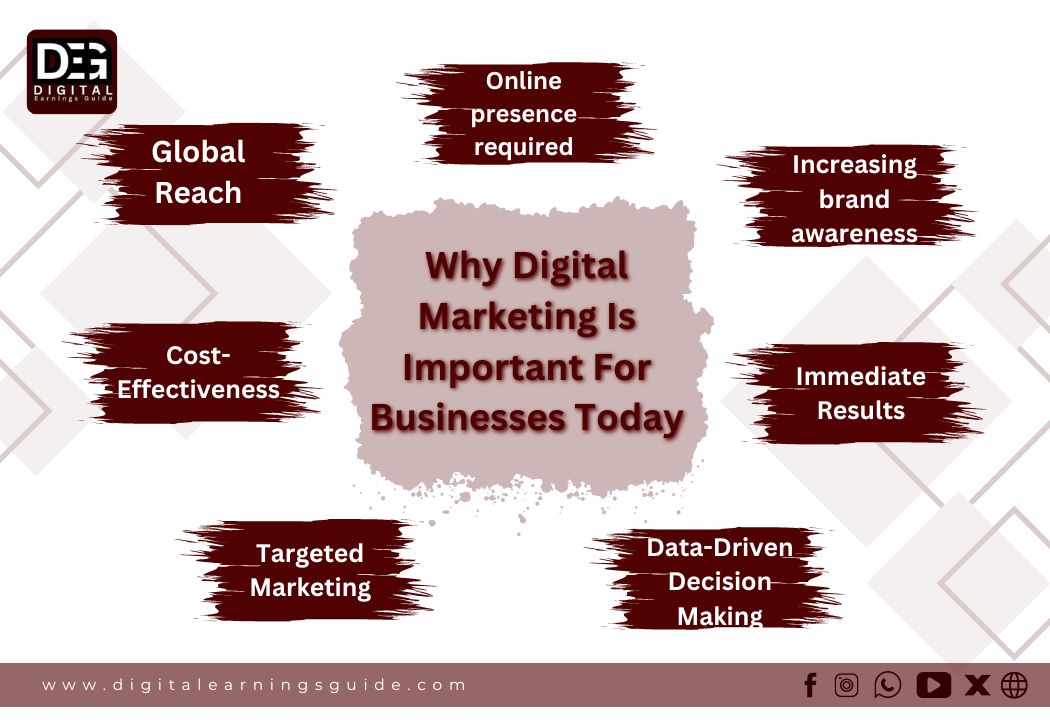
-
Online presence required:
Nowadays most of the consumers are using the internet, and they search online before making any decision. Online presence of a business is very important so that they can reach their potential customers. A strong digital presence strengthens the brand’s reputation and earns the trust of consumers.
- Example:
Presence on Google not only makes the business accessible but also increases the credibility of the business in the eyes of consumers.
-
Global Reach:
Through digital marketing you can reach your customers worldwide. With its help, business can be promoted not only locally but also internationally. By using digital platforms you can target a wide range of consumers and build direct relationships with them.
- Example:
By running ads on platforms like Facebook, Instagram, and Google, you can promote your products or services in any geographic area.
-
Cost-Effectiveness:
Compared to traditional marketing such as TV or radio advertising, digital marketing is a much more cost-effective method. In this you can design your marketing campaigns according to your budget and get better results without spending a lot of money. Moreover, with digital marketing you can measure and optimize your campaigns.
- Example:
PPC (Pay-Per-Click) advertising pays only when a user clicks on your ad, avoiding unnecessary spending.
-
Targeted Marketing:
In digital marketing you can target your target customers based on specific criteria such as age, location, interests, or online activities. This allows you to target your ads to people who are actually interested in your product or service, improving marketing efficiency.
- Example:
With Facebook or Google Ads, you can target your campaign to customers based on specific age, gender, location, or interests.
-
Data-Driven Decision Making:
A major feature of digital marketing is that it provides you with accurate data to analyze the performance of each campaign. With Google Analytics, social media insights, and other tools, you can see which strategies are working and where improvements are needed. This allows you to make better and more effective decisions.
- Example:
If the click-through rate (CTR) of a particular ad is decreasing, you can easily change it to get better results.
-
Immediate Results:
In digital marketing you get faster results than traditional marketing. With PPC or social media marketing you can see an immediate increase in traffic, leads and sales. This allows the business to get instant feedback and can change its strategy quickly.
- Example:
A Google Ads or Social Media Ads campaign can bring thousands of customers to your website within hours.
-
Increasing brand awareness:
Digital marketing increases brand recognition. Through various digital channels like social media, blogs, and videos you can reach your brand to a wider audience and introduce them to your brand. Consistent brand presence imprints the brand permanently in the minds of customers.
- Example:
Through consistent social media posts and blogs, you can strengthen your brand identity.
-
Direct Interaction with Customers:
Through digital marketing you can establish a direct relationship with your customers. On platforms like social media, email, or live chat, you can instantly get feedback from customers, answer their questions, and better educate them about your services.
- Example:
Through social media, you can directly answer your customers’ questions and solve their problems immediately.
-
Competitive Edge:
Almost every business is using digital marketing nowadays. If you don’t use it, you may fall behind your competition. Adopting a digital marketing strategy puts you ahead of the competition and makes your business stand out in the market.
- Example:
If your competitors are active in social media or SEO and you are not, your customers are likely to gravitate towards them.
-
Adapting to the Digital Age:
We are living in an era where most of the activities are done online, and businesses need to use digital platforms to reach out to their customers. Adopting digital marketing has become imperative to meet the demands of the digital age.
- Example:
The use of e-commerce websites, mobile apps, and social media platforms has become essential for all types of businesses.
Digital Marketing Channels and Their Benefits:
Digital marketing uses different channels, which give businesses different ways to reach and engage their target customers. Each channel has its own distinct advantages that make a business’s marketing strategy effective. Here are some important digital marketing channels and their benefits:
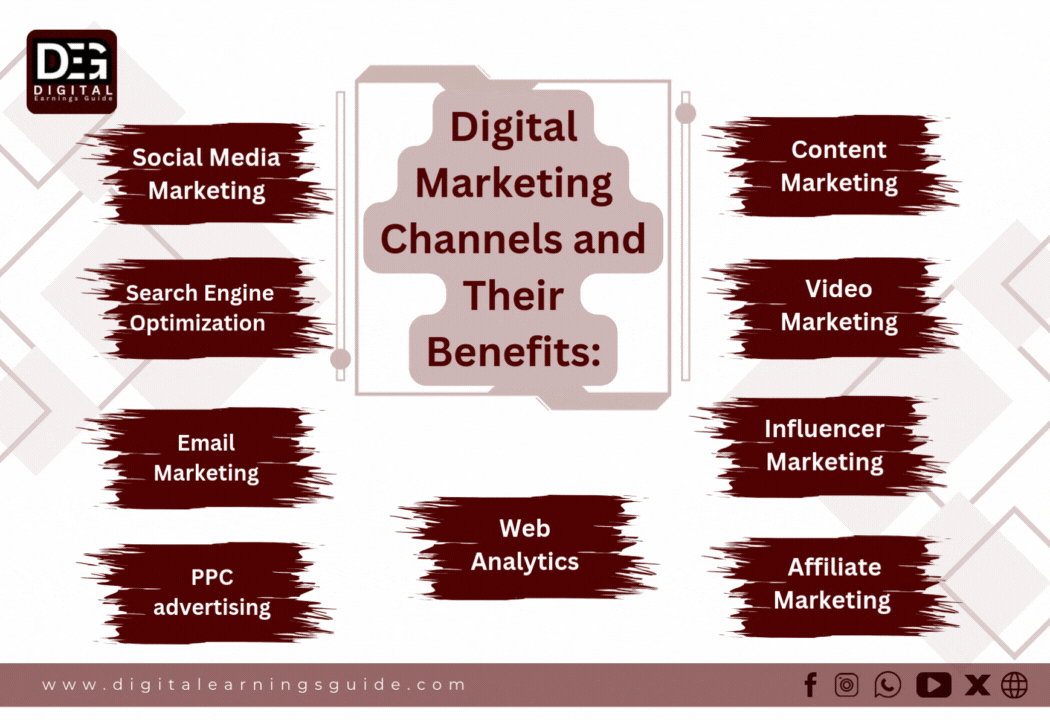
-
Social Media Marketing
Social media marketing uses Facebook, Instagram, Twitter, LinkedIn and other social media platforms. Through this channel, brands can deliver their messages to consumers and interact directly with customers.
Advantages:
- Brand recognition: Social media presence increases brand recognition.
- Targeted advertising: The ability to reach target customers by specific age, location, and interests.
- Engagement: Facilitate direct interaction with customers and immediate feedback.
-
Search Engine Optimization (SEO)
SEO is a technique that aims to give a website a better ranking in search engines so that it appears in the search results of users.
Advantages:
- Organic Traffic: Opportunity to get more organic traffic.
- Permanent Results: The effects of SEO are long term, leading to continuous traffic.
- Brand Reputation: A higher ranking increases brand reputation.
-
Email Marketing
Email marketing involves sending emails to specific customers based on their interests. These may be in the form of promotional, educational, or newsletters.
Advantages:
- Personalized communication: Personalized communication with customers can be done through email.
- Targeted campaigns: The facility to send targeted messages to specific user groups.
- Data Analytics: Ability to measure the success of campaigns through email open rates and click-through rates.
-
PPC advertising
PPC is a model where a business only has to pay when a user clicks on their ad. This can be done through Google Ads and social media advertising.
Advantages:
- Instant Results: PPC campaigns can generate instant traffic.
- Full Control: Ability to control budget and target customers.
- Monitoring Results: Facilitate optimization of campaigns through real-time performance data.
-
Content Marketing
Content marketing involves the creation of blogs, videos, infographics, and other content, with the goal of informing consumers and connecting them with a brand.
Advantages:
- Building trust: Useful content builds trust for a brand among consumers.
- SEO Improvement: Quality content is also beneficial for SEO.
- Engagement: The ability to engage users through content.
-
Video Marketing
Video marketing uses videos to convey a brand story, product promotion or educational content.
Advantages:
- Increased engagement: Videos are more engaging and interesting.
- Better Promotion: Videos can be easily shared on social media and websites.
- Visual learning: Some people learn better through videos, which is useful for explaining products or services.
-
Influencer Marketing
Influencer marketing involves promoting a brand through celebrities or social media influencers.
Advantages:
- Building trust: Positive feedback about a brand through influencers builds trust among consumers.
- Access to New Audiences: Opportunity to reach new customers through influencer’s followers.
- Content Creation: Influencers themselves also create content that helps in brand exposure.
-
Affiliate Marketing (Affiliate Marketing)
In affiliate marketing, others are paid a commission in exchange for promoting their products or services.
Advantages:
- Risk-free Promotion: Products can be promoted without any initial investment.
- Wider reach: Opportunity to reach new customers through various affiliate partners.
- Performance Based: Payments are made only when a sale or click occurs.
-
Web Analytics
With web analytics you can analyze your website’s performance, user behaviors, and other important metrics.
Advantages:
- Performance Analysis: The ability to analyze website traffic and user behavior.
- Improvement Opportunities: Making informed decisions to improve operations.
- Informative reporting: Comparing the performance of different channels.
Trends Shaping the Future of Digital Marketing:
The field of digital marketing is evolving rapidly and new trends are emerging that are shaping marketing strategies. Here are some of the key trends in digital marketing in the future that will play a major role in reshaping it:
-
Artificial Intelligence (AI) and Machine Learning
Artificial intelligence and machine learning are helping to analyze data, predict consumer behavior, and optimize marketing campaigns. These technologies will be used to understand user interests and preferences.
- Future Impact:
Businesses will be able to personalize their marketing strategies, which will provide better experiences to customers.
-
Growing Popularity of Video Content
Videos not only provide entertaining content but are also informative. The growing popularity of video content on platforms like YouTube, Instagram, and TikTok is a major trend in the marketing world.
- Future Impact:
Video content creation and promotion will increase, which will help increase user engagement.
-
Voice Search Optimization
With the increasing use of voice search technologies like Alexa and Google Assistant, businesses need to optimize their websites and content for voice search.
- Future Impact:
As the way consumers search changes, businesses need to adapt their SEO strategies.
-
Data Privacy and Security
Laws regarding consumer information protection are becoming more stringent, such as GDPR and CCPA. Businesses need to adapt their marketing strategies while respecting consumer information.
- Future Impact:
With better data management and transparency, it will help restore consumer trust.
-
Social Media E-Commerce
Social media platforms are now becoming not only a source of information but also a source of purchase. Platforms like Facebook and Instagram have introduced new ways to purchase.
- Future Impact:
Businesses will be able to sell their products directly through social media, making it easier for customers.
-
Impact of Mobile Marketing
The use of mobile devices is increasing and with it, mobile marketing is becoming more important. Mobile apps, websites, and mobile advertising will play a major role in the marketing world of the future.
- Future Impact:
Businesses need to optimize their websites and apps to deliver the best mobile experiences.
-
The Growing Influence of Influencer Marketing
With the help of influencers, brands can communicate their messages more effectively to consumers. New audiences can be reached through influencer marketing.
- Future Impact:
Businesses will increasingly incorporate influencers into their marketing strategies, which will further strengthen their brand identity.
-
Demand for Interactive Content
There is a growing demand for interactive content such as quizzes, surveys, and videos to engage consumers. This content provides a better user experience.
- Future Impact:
There will be an increase in the creation of interactive content, which will help increase customer engagement.
-
Cloud technology on the rise
With secure and effective data analysis through cloud computing, companies can improve their marketing strategies.
- Future impact:
Companies will be able to quickly improve their strategies by analyzing data effectively.
-
ER (Augmented Reality) and VR (Virtual Reality)
ER and VR technologies offer new experiences to consumers, such as seeing products virtually to try them on.
- Future impact:
The use of ER and VR will open up new dimensions in marketing, providing better experiences to consumers.
Steps to Get Started with Digital Marketing:
Getting started with digital marketing is extremely important for a business or brand, as it is an effective way to reach out to customers, build brand awareness, and increase sales. If you want to get started with digital marketing, here are some important steps that will help you:
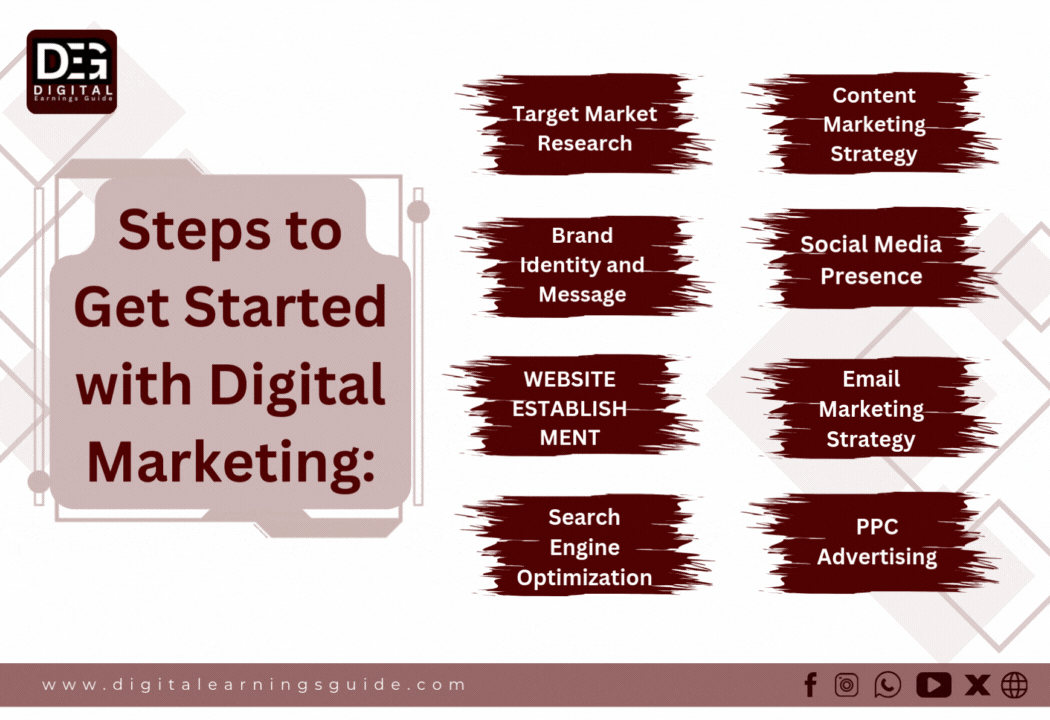
-
Target Market Research
First, you need to understand who your target customers are. Research their age, gender, interests, location, and purchasing behavior.
- Action:
Use online surveys, market research, and customer feedback to better understand your target market.
-
Brand Identity and Message
Create your brand identity, including logo, colors, and brand voice. This will provide a clear identification of your messaging.
- Action:
Define brand goals, values, and differentiation, so that your message is clear and compelling.
-
WEBSITE ESTABLISHMENT
Create a professional, user-friendly website, which reflects your brand identity and provides information to customers.
- Action:
Choose a platform for website design (e.g. WordPress, Wix, or Squarespace) and add details about your services or products.
-
Search Engine Optimization (SEO)
Optimize your website according to SEO principles so that it ranks better in search engines.
- Action:
Research keywords and use them in your website’s content, meta tags, and images.
-
Content Marketing Strategy
Create useful, interesting, and informative content that is helpful to your target customers. This can be in the form of blogs, videos, or social media posts.
- Action:
Create a content calendar and plan to post content on a regular basis.
-
Social Media Presence
Create an effective presence on social media platforms (such as Facebook, Instagram, Twitter, and LinkedIn).
- Action:
Choose platforms based on your target customers and share your content on them regularly.
-
Email Marketing Strategy
Connect directly with your customers through email marketing. Send newsletters, promotions, and informational emails.
- Action:
Add an email subscription form to your website and provide a special offer for subscribers.
-
PPC Advertising
Run PPC campaigns so that you can get instant traffic. This can be done through Google Ads or social media advertising.
- Action:
Set a budget and create effective ads to reach target customers.
-
Performance Evaluation and Analysis
Use various analytics tools to measure the performance of your digital marketing campaigns.
- Action:
Use Google Analytics and social media analytics tools to analyze the success of your campaigns.
-
Periodic Improvements
Analyze the results of your campaigns and make changes to improve them. Also keep an eye on new market trends.
- Action:
Update your strategies periodically so that your marketing remains effective.
Conclusion:
Getting started with Digital marketing is critical to business success. Through an understanding of target customers, a strong brand identity, and an effective online presence, businesses can optimize their marketing strategy. Content creation, data analysis, and performance testing of marketing campaigns also play a key role in success.
Adopting future trends such as AI, video marketing, and social media e-commerce makes businesses competitive. Thus, an effective digital marketing strategy helps the business grow strongly and face future challenges.

